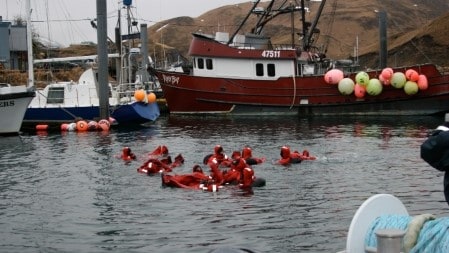Key points
- NIOSH funds occupational research and training specifically for commercial fishing, an especially dangerous industry.
- The program is a partnership with the U.S. Coast Guard.
- Funded research focuses on improving safety in the commercial fishing industry.
- Training project grants support high-quality, regionally specific safety training.

Funding overview
Commercial fishing is one of the most dangerous occupations in the United States. The hazards fishermen face can vary widely by vessel and fishery. Despite some recent successes in reducing fatal work-related injuries, the need for targeted safety research and training remains essential.
The Commercial Fishing Occupational Safety Research and Training Program is a partnership between the U.S. Coast Guard and NIOSH. It was created to provide funding for two purposes. The first is to advance fishing safety research. The second is to provide targeted, regionally appropriate training for the nation's commercial fishermen.
NIOSH awards funding to qualified
- Individuals in academia,
- Members of non-profit organizations,
- Municipalities, and
- Businesses involved in the U.S. commercial fishing industry.
Learn more about applying
Funding by category
Research
The goal of the research program is to support research on methods of improving the safety of the commercial fishing industry. This includes:
- Vessel design
- Emergency and survival equipment
- Enhancement of vessel monitoring systems
- Communications devices
- De-icing technology
- Severe weather detection
Training
The goal of the training project grant program is to enhance the quality and availability of safety training for commercial fishermen. The specific objectives of the program are to:
- Address the training needs of commercial fishermen with regional differences and specific fleets in mind,
- Increase the number of qualified maritime safety instructors and drill conductors in the United States to conduct these types of trainings,
- Develop, offer, and implement "train the trainer" and refresher courses,
- Develop and deliver hands on safety training to commercial fishermen, and
- Provide qualified instructors and faculty to achieve the goals of this program.
Recipients
Award recipients include:
Research
- Alaska Marine Safety Education Center (Alaska)
- American Bureau of Shipping (Texas)
- Fishing Partnership Health Plan (Massachusetts)
- Iowa State University (Iowa)
- Mississippi State University (Mississippi)
- Northeast Center for Occupational Health and Safety in Agriculture, Forestry, and Fishing (New York)
- Oregon State University (Oregon)
- University of Massachusetts-Lowell (Massachusetts)
- University of Texas Health Center at Tyler (Texas)
- University of Texas Health Science Center at Houston (Texas)
Training
- Alaska Marine Safety Education Center (Alaska)
- Fishing Partnership Health Plan (Massachusetts)
- Maine Center for Coastal Fisheries (Maine)
- Masters, Mates and Pilots Maritime Advancement, Training, Education and Safety Program (Washington)
- Oregon State University (Oregon)
- REDDE, LLC (Maine)
- University of Georgia (Georgia)
Policy
The Fishing Safety Research Grant Program was established by The Coast Guard Authorization Act of 2010 (P.L. 111-281), as amended by the Howard Coble Coast Guard and Maritime Transportation Act of 2014 (P.L. 113-281).
NIOSH administers the program through a Memorandum of Understanding with the U.S. Coast Guard signed in 2018.
Historical funding information
NIOSH currently funds commercial fishing safety research under RFA-OH-22-005. Previously, NIOSH made awards under RFA-OH-20-002.
NIOSH currently funds commercial fishing safety training under RFA-OH-22-006. Previously, NIOSH made awards under RFA-OH-20-003.
